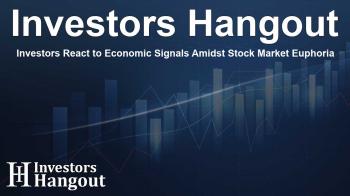Investors React to Economic Signals Amidst Stock Market Euphoria

Understanding Current Market Dynamics
In recent discussions surrounding economic trends, investors are facing a pivotal moment. Ruchir Sharma has pointed out a significant shift in investor sentiment that may unravel in the near future. As he suggests, there could be a critical demand for higher interest rates or a demonstration of fiscal responsibility, triggering potential turbulence in the U.S. stock market.
Investor Behavior in a Volatile Market
Despite these warning signs, it seems that fund managers have not fully absorbed this information. Reports indicate that fund managers are currently reducing cash reserves to an all-time low while simultaneously investing heavily in U.S. stocks. This trend suggests a strong sense of confidence or perhaps an unwillingness to miss out on potential gains.
The Fed's Influence and Investor Psychology
Concerns are emerging regarding the Federal Reserve's recent monetary policies. Both officials within and outside the Fed are expressing apprehension that their decision to loosen financial conditions may become a historical misstep. Such a worry speaks to the broader implications of monetary policy on market stability.
Psychological Insights from Market Trends
In the context of market dynamics, John Hussman highlights that certain valuation metrics and price behaviors tend to arise when fear of missing out (FOMO) reaches extreme levels. This fervor in speculative investments is becoming evident, with recent market observations revealing significant warning signs.
Seeking Opportunity Amidst Uncertainty
Amid the increasing market volatility, there may be room for strategic investments. Yet, looking to icon investors like Warren Buffett reveals that the most attention-grabbing sectors may not offer the best opportunities. Instead, a more discerning approach may yield better long-term returns.
Market Outlook: Caution and Strategy
The current market situation underscores the importance of a cautious strategy. Investors should remain vigilant, weighing the risks of prevailing euphoria against potential shifts in economic policy. Staying informed and adaptable will be key as we navigate through uncertain waters.
Frequently Asked Questions
What signs indicate a potential shift in the stock market?
Investors should watch for demand for higher interest rates and changes in fiscal policy, as these may signal a change.
Why are fund managers reducing cash reserves?
Funds managers are feeling optimistic about stock performance, potentially influenced by market trends and economic forecasts.
What is FOMO and how does it affect investments?
FOMO, or fear of missing out, can lead to irrational investment decisions, driving prices up and increasing market volatility.
How does the Federal Reserve impact stock market behavior?
The Fed’s monetary policies significantly influence investor confidence and market liquidity, affecting stock prices.
What investment strategies should be considered in this climate?
Investors might focus on sectors with solid fundamentals and undervalued stocks as opposed to following market trends dictated by FOMO.
About Investors Hangout
Investors Hangout is a leading online stock forum for financial discussion and learning, offering a wide range of free tools and resources. It draws in traders of all levels, who exchange market knowledge, investigate trading tactics, and keep an eye on industry developments in real time. Featuring financial articles, stock message boards, quotes, charts, company profiles, and live news updates. Through cooperative learning and a wealth of informational resources, it helps users from novices creating their first portfolios to experts honing their techniques. Join Investors Hangout today: https://investorshangout.com/
Disclaimer: The content of this article is solely for general informational purposes only; it does not represent legal, financial, or investment advice. Investors Hangout does not offer financial advice; the author is not a licensed financial advisor. Consult a qualified advisor before making any financial or investment decisions based on this article. The author's interpretation of publicly available data shapes the opinions presented here; as a result, they should not be taken as advice to purchase, sell, or hold any securities mentioned or any other investments. The author does not guarantee the accuracy, completeness, or timeliness of any material, providing it "as is." Information and market conditions may change; past performance is not indicative of future outcomes. If any of the material offered here is inaccurate, please contact us for corrections.
